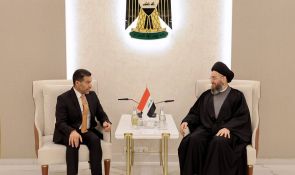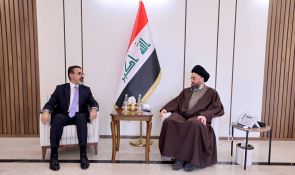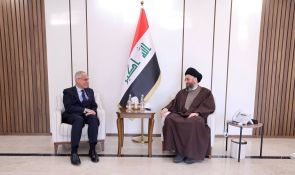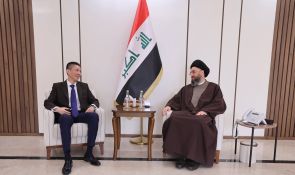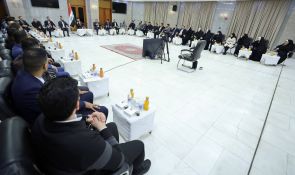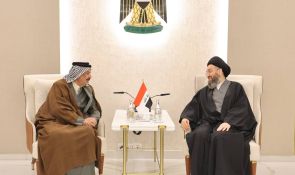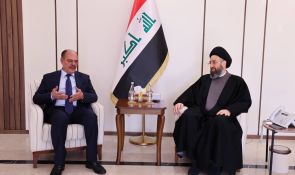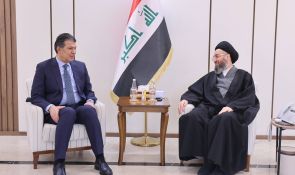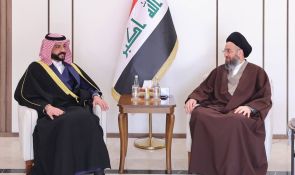Sayyid Al-Hakeem: Leaders’ assassination will pave way for experienced, organized, modern technology proficient, new leaders’ generations
During a gathering with Baghdad's youth elites and professionals, Sayyid Ammar Al-Hakeem, Head of the National State Powers’ Alliance, expressed his condolences for the martyrdom of a group of mujahideen, led by the late martyr Sayyid Hassan Nasrallah, may Allah have mercy on him. His Eminence also extended congratulations on the occasion of Iraq’s National Day. His Eminence highlighted that over 75% of Iraq’s population consists of young people, presenting both an opportunity and a challenge to harness their potential and meet their ambitions.
His Eminence explained that Iraq has endured successive wars and immense pressure, but thanks to the sacrifices of its people, the country has achieved unprecedented stability in the last two years. H.E. called for permanent stability by leveraging Iraq’s resources to accelerate recovery. H.E. rejected unfair comparisons between Iraq and other nations that haven’t faced the same challenges and have enjoyed decades of positive progress, stressing the importance of maintaining Iraq’s momentum.
H.E. emphasized that Palestine has faced a 75-year crisis, with its Arab Muslim population subjected to displacement, discrimination, and genocide. H.E. noted that the Israeli project seeks to reduce the Palestinian issue to one of a people without land. Despite numerous UN Security Council resolutions condemning Israel’s actions, none have been enforced, and the crisis cannot be solely attributed to the events of October 7 last year.
H.E. warned of Israel’s expansionist ambitions at the expense of its neighboring countries and argued that today’s situation is the outcome of decades of pressure and violations. Hezbollah’s involvement, H.E. said, was driven by solidarity with the Palestinian people and aimed at relieving the pressure on Gaza. H.E. also pointed out that ceasefire efforts have repeatedly failed due to Israel’s unreasonable conditions.
Sayyid Al-Hakeem highlighted that liberation movements are not reliant on a single person or leader, noting Hezbollah’s deep reservoir of knowledge and experience. H.E. remarked that assassinating leaders would lead to the rise of new, more experienced generations who are better organized and skilled in modern technology, likely bringing about a shift in the party’s movement.
H.E. further noted that the battlefield has demonstrated the strength and readiness of the mujahideen. While replacing a figure like Sayyid Nasrallah would be difficult, a capable successor will emerge to take charge. H.E. stressed the importance of learning from history and recognizing the evolving tools of resistance in both Palestine and Lebanon.
H.E. reiterated Iraq’s solidarity and political support for the Palestinian and Lebanese peoples, particularly in efforts to end the war, call for a ceasefire, and rally public opinion in support of their causes.
H.E. underscored the importance of media advocacy and leveraging social media to raise awareness of the suffering in Palestine and Lebanon. H.E. called for greater faith in the power of prayer and its significant impact, as well as continued humanitarian and relief efforts, encouraging the Iraqi people, known for their generosity, to contribute both officially and publicly.
Sayyid Al-Hakeem also emphasized the need to draft legislation in collaboration with relevant sectoral bodies and to engage experts from various fields in government, academia, and the private sector. He noted that early elections require both political will and technical capacity, which are currently lacking. H.E. praised Al-Hikma Movement as a symbol of success in empowering youth since its founding and called for a balance between the Iraqi people and their representatives in both the legislative and executive branches. H.E. urged showcasing successful youth models and promoting generational integration, highlighting the need for political action that aligns with Iraq’s political system and emphasizing the importance of regional stability for the stability of its countries.


